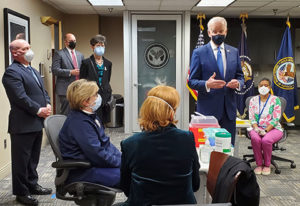Legislation Also Makes Spouses, Some Caregivers Eligible
WASHINGTON — The VA is smoothing the way for all U.S. veterans, their spouses and caregivers to get vaccinated against COVID-19.
Thanks to new legislation passed last month, all of those will be eligible to receive the COVID-19 vaccine at VA facilities, even if the veteran is not enrolled in VA healthcare.
The legislation was crafted in response to reports that veterans who were ineligible for VA healthcare were being turned away from VA vaccine sites and that many veterans were waiting to get the vaccine elsewhere so they could get it at the same time as their spouse or caregiver.
“After such a difficult year, stories of vulnerable veterans being denied lifesaving vaccines from VA are painful to hear,” said Rep. Mike Bost (R-IL), the ranking Republican on the House VA committee.

President Joe Biden along with Carolyn Clancy, MD, Acting Deputy Secretary of Veterans Affairs, were hosted by VA Secretary Denis McDonough at the Washington DC VAMC in March. The president observed the Veterans COVID-19 Vaccine Clinic firsthand and thanked the vaccination team members for their important work. He also watched Nurse Executive Denise Boehm administer the medical center’s first dose of the Johnson & Johnson/Janssen COVID-19 vaccine to Army Veteran Marvin Cornish.
In recent hearings, VA leaders testified that the department’s vaccine distribution infrastructure was very robust and that they could handle more patients than they were currently vaccinating. The only limitations were vaccine supply and regulations that limited vaccines only to veterans who were eligible and enrolled in agency healthcare. That meant that veterans whose income was above a certain threshold and who did not have any service-connected conditions had to be turned away.
“The strength of VA’s internal healthcare delivery system and the department’s successful role in national vaccination efforts makes this expansion possible, but I know this is a heavy lift,” said Rep. Mark Takano (D-CA.), who heads the committee. “That’s why this expansion must be contingent on having adequate supply of the vaccine. Even with the expanded authority granted [by Congress], VA must continue to prioritize vaccinations and healthcare delivery for our nation’s veterans that are enrolled in VA care.”
The legislation expands vaccine eligibility to veterans who are not eligible for enrollment in VA healthcare, caregivers of veterans enrolled in various VA home-based and long-term care programs, spouses of veterans and CHAMPVA recipients—spouses of permanently and totally disabled veterans or of veterans who have died from service-connected disabilities.
As for the department’s vaccine supply, VA officials testified in late February that they were receiving approximately 125,000 doses a week—about a third of what they had the capacity to distribute. Acting Under Secretary for Health Dr. Richard Stone, MD, said, however, that VA expected to see that number expand significantly in March.
Another challenge for VA with the passing of the legislation is the extra workload of tracking vaccine distribution for people who are not enrolled in its healthcare system.
“We’re required to report to the [national Centers for Disease Control and Prevention] person who gets vaccinated by us,” explained VA Secretary Denis McDonough at a House Veterans’ Affairs Committee hearing held after the legislation passed. “We’ll have to build that in for noneligible veterans and caregivers.”
Also a concern for legislators and VA officials is delivering vaccines to veterans in highly rural areas. In some cases, VA has resorted to chartering planes to make special delivery to isolated veterans.
In Kalispell, MT, private charter delivered 400 doses of the Moderna vaccine to high-risk veterans. The area is one of the most remote parts of the state—about 200 miles from Fort Harrison where the flight originated. VA also is reaching veterans using mobile shot clinics that travel to rural areas and set up vaccine distribution sites at veteran centers, National Guard sites and other public buildings. If such a partner site does not exist, veterans can be given the vaccine in VA mobile trailers, which can accommodate up to three patients at a time.
The Battle Creek, MI, VAMC has made extensive use of mobile distribution, with a plan to hit 22 counties in southwest Michigan. The mobile vaccine walk-in clinics not only save veterans the trouble of driving hours to the nearest VA facility but eliminates the hassle of scheduling an appointment.
About 4.7 million veterans live in rural areas. Of those, 2.7 million are enrolled for VA care. In general, about 58% of rural veterans enroll in VA care compared to 37% of their urban counterparts. VA also has stressed that rural veterans skew older and have higher rates of poverty with less access to physicians and hospitals, making them particularly susceptible to poor outcomes from COVID-19.
As of March 23, VA had fully vaccinated just under 1.5 million veterans, employees, and federal partners. At that time, VA had tracked about 240,000 total COVID-19 cases across its system. Of those, just more than 11,000 resulted in death, with,788 occurring in VA inpatients.
